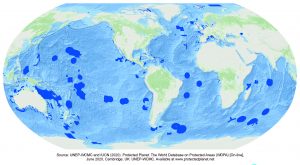News and Announcements
Press Release – International Fishery Experts Agree on Key Area-Based Management Concepts (19 June 2020)

7.4% of the global ocean is covered by protected areas, which is only one of many area-based management tools available
The participants agreed that simply closing large sections of the ocean is not a silver bullet for managing blue water fisheries and their ecosystems and that marine protected areas (MPAs) are merely a single element within the tool box of area-based management.
Area-based management may be static in nature (i.e., have a fixed spatial delineation) or dynamic, whereby portions of the ecosystem closed to fishing can change in space and time. The workshop called for clarity in objectives, monitoring and area-based selection and comparing static vs dynamic area-based approaches.
Participants pointed out that with rapidly emerging technologies to collect data and monitor fisheries, area-based management can be adaptive and more precise in its implementation. But these objectives and management capabilities are also linked with specific need for empirical evidence and research.
“We can’t really predict the impacts of many actions because of information gaps,” Hilborn said.
Stakeholders and leading scientists cautioned for clear planning on the use of area-based management tools in blue water ecosystems rather than strictly opportunistic or “set it and forget it” implementation. Highly migratory fish movements are dynamic and their distributions are often moving, so scientific evaluation in planning is critical.
“Economic, cultural and social objectives need to be considered thoroughly prior to implementation of area-based management, and industry engagement is critical,” noted Craig Severance, professor of anthropology emeritus, University of Hawai‘i at Hilo.
Alternative management measures should be explored and evaluated alongside any area-based management measures considered, including take MPAs, the participants agreed.
The workshop will produce the “Roadmap” document by the end of 2020 for publication as peer-reviewed literature.
